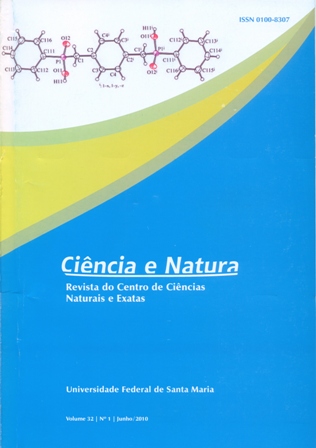Diagnóstico Ambiental do Corede norte, RS: Mapeamento do uso da Terra na Região Alto Uruguai e obtenção de Banco de dados Relacional de Fragmentos de Vegetação Arbórea
DOI:
https://doi.org/10.5902/2179460X9501Resumo
O uso da informática na obtenção de dados e a evolução de equipamentos de campo e laboratório vêm possibilitando análises de dados ambientais com uma precisão espacial cada vez maior. Assim, o mapeamento de informações de uso da terra tem se tornado uma importante ferramenta no estudo da dinâmica da paisagem. Pensando em estratégias voltadas ao planejamento de uma paisagem regional determinada pelo COREDE-Norte, que recebe a denominação de Região Alto Uruguai (RAU), em 2004 por meio de verba regional obtida pela Consulta Popular iniciou-se a estruturação de um banco de dados relacional para os 31 municípios integrantes deste espaço geográfico. Como resultado obteve-se em escala regional e municipal o mapeamento temático multifinalitário em escala 1:50.000. A obtenção de um novo banco de dados relacional corrigiu a hidrografia e os limites municipais e atualizou a malha viária. A metodologia envolveu o sistema de posicionamento a campo, mapeamento relacional de hipsometria, clinografia, estruturação de bacias hidrográficas pelo método de Otto, classificação dos solos de acordo com o boletim 30 da Secretaria Estadual da Agricultura, mapeamento das áreas de preservação e conservação, classificação e ajuste dos usos da terra e, por fim, o mapeamento de áreas em conflitos de uso da terra. De posse deste banco de dados estruturados, partiu-se para a etapa de análises das informações. Obtiveram-se dados provenientes de análises estatísticas aplicadas com operadores de contexto ao se trabalhar com fragmentação florestal e com a aplicação de métricas para a identificação de distribuição, índice de forma, tamanho, número de fragmentos por bacia hidrográfica e por município. Os resultados obtidos estão relacionados aos fatores que interferem na estrutura dos fragmentos mapeados, além da apresentação das melhores características de integridade para o desenvolvimento de outros projetos. Palavras-Chave: Mapeamentos temáticos, Região Alto Uruguai (RAU), Uso da Terra.Downloads
Downloads
Publicado
Como Citar
Edição
Seção
Licença
Para acessar a DECLARAÇÃO DE ORIGINALIDADE E EXCLUSIVIDADE E CESSÃO DE DIREITOS AUTORAIS clique aqui.
Diretrizes Éticas para Publicação de Revistas
A revista Ciência e Natura está empenhada em garantir a ética na publicação e na qualidade dos artigos.
A conformidade com padrões de comportamento ético é, portanto, esperada de todas as partes envolvidas: Autores, Editores e Revisores.
Em particular,
Autores: Os Autores devem apresentar uma discussão objetiva sobre a importância do trabalho de pesquisa, bem como detalhes e referências suficientes para permitir que outros reproduzam as experiências. Declarações fraudulentas ou intencionalmente incorretas constituem comportamento antiético e são inaceitáveis. Artigos de Revisão também devem ser objetivos, abrangentes e relatos precisos do estado da arte. Os Autores devem assegurar que seu trabalho é uma obra totalmente original, e se o trabalho e / ou palavras de outros têm sido utilizadas, isso tem sido devidamente reconhecido. O plágio em todas as suas formas constitui um comportamento publicitário não ético e é inaceitável. Submeter o mesmo manuscrito a mais de um jornal simultaneamente constitui um comportamento publicitário não ético e é inaceitável. Os Autores não devem submeter artigos que descrevam essencialmente a mesma pesquisa a mais de uma revista. O Autor correspondente deve garantir que haja um consenso total de todos os Co-autores na aprovação da versão final do artigo e sua submissão para publicação.
Editores: Os Editores devem avaliar manuscritos exclusivamente com base no seu mérito acadêmico. Um Editor não deve usar informações não publicadas na própria pesquisa do Editor sem o consentimento expresso por escrito do Autor. Os Editores devem tomar medidas de resposta razoável quando tiverem sido apresentadas queixas éticas relativas a um manuscrito submetido ou publicado.
Revisores: Todos os manuscritos recebidos para revisão devem ser tratados como documentos confidenciais. As informações ou ideias privilegiadas obtidas através da análise por pares devem ser mantidas confidenciais e não utilizadas para vantagens pessoais. As revisões devem ser conduzidas objetivamente e as observações devem ser formuladas claramente com argumentos de apoio, de modo que os Autores possam usá-los para melhorar o artigo. Qualquer Revisor selecionado que se sinta desqualificado para rever a pesquisa relatada em um manuscrito ou sabe que sua rápida revisão será impossível deve notificar o Editor e desculpar-se do processo de revisão. Os Revisores não devem considerar manuscritos nos quais tenham conflitos de interesse resultantes de relacionamentos ou conexões competitivas, colaborativas ou outras conexões com qualquer dos autores, empresas ou instituições conectadas aos documentos.






